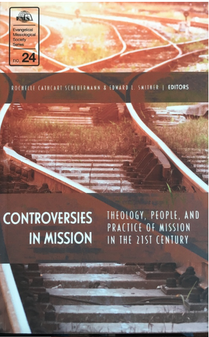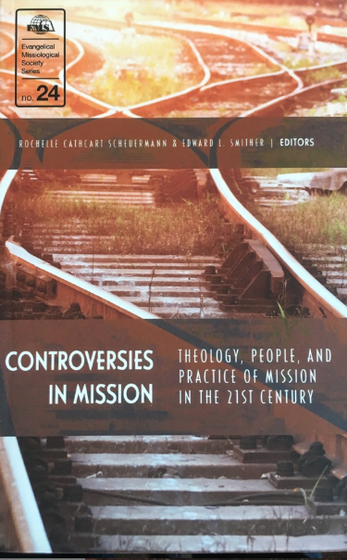posts
 In the opening chapter of Controversies in Mission, Bob Priest discusses the apostle Paul and mission controversy and offers the following reflections that not only offer shape to this book but critical questions for mission practitioners to ponder. As part of his conclusion, Priest writes: The apostle Paul exemplified an incredible ability to make cultural adjustments. However, it is also true that he called on believers to resist other social influences. That is, the adjustments he calls for are not without accompanying concerns for faithful orthodoxy and orthopraxy. In the remainder of this book, authors are engaging difficult issues. These matters are truly difficult. The following are a few implications of what we have considered that should be kept in mind as one approaches these discussions. 1. The simple missionary activity of transmitting the gospel across cultural and ethnic divides triggers profound difficulties and questions that are not easy to resolve. Thus, missiology is a field that naturally raises deeply difficult issues. 2. Christians who are not bicultural and who lack cultural or missiological training, but who nonetheless attempt ministry across cultural and religious lines will naturally and ethnocentrically tend, like the Judaizers before them, to treat cultural elements from their own culture as normative for others. This is a problem. 3. When Christian missionaries are ethnocentric, and also operate from positions of socio-economic strength, this becomes doubly problematic. It is vital that our missiological reflection be attentive to dimensions of power and neocolonialism. 4. In most mission settings, there has already been a long history of missionary engagement often exemplifying the same patterns the Apostle Paul critiqued. That is, such history has often involved both ethnocentrism and power dynamics. Sometimes missionaries demanded that converts adopt new names from missionary host countries. Sometimes they required Hindu converts to eat beef or Muslim converts to eat pork, or insisted that the church use musical aesthetics birthed in Europe or North America, for example. This prior history has often contributed to problematic Christian patterns and identities, posing profound difficulties for new or potential believers, and for those attempting to encourage a reframing of missional engagement in more Pauline ways. 5. When missionaries and missiologists wish to make adjustments that will reduce inappropriate barriers to the gospel, they are fully in the train and lineage of Paul, and should not simply be labeled postmodern relativists. 6. However, this does not mean that every adjustment is a good one. Critical judgment, both theological and missiological, needs to be brought to bear on the issues involved. Healthy forms of contextualization must be pursued. However, inappropriate syncretism must be guarded against. 7. The best people to exercise critical review of such new proposals should be Christians who are missiologically trained, and who are not culturally and linguistically distant from the settings where the issues at stake are located. 8. However, we do need forums for engaging the issues, just as the Jerusalem Council provided. Missiology conferences, and peer-reviewed publications such as this one, are ideal venues comprising an ideal community for testing and evaluating the ideas involved. That is, a community of those who are deeply knowledgeable about the cultural, linguistic, and religious contexts in view, as well as of Bible and theology, and who have advanced missiological training, are ideally positioned to help the body of Christ consider the issues. This book provides one such forum for us to examine and evaluate the issues at stake, as we endeavor faithfully and appropriately to follow in the missionary lineage of Paul.  I had the privilege to co-edit (with Rochelle Cathcart Scheuermann) the 2016 Evangelical Missiological Society Monograph entitled, Controversies in Mission: Theology, People, and Practice of Mission in the 21st Century. Controversies was the theme of the 2015 EMS annual meeting and this volume comprises the key papers presented at that conference. Below is a brief overview of the book with the table of contents: Crossing social, cultural, and religious barriers and making disciples of all nations has probably never been without some level of controversy. This book is an attempt to hit the pause button on this rapid-paced world and to refllect on how we do mission, especially in light of the new layers of complexity that globalization brings. While the contributors engage in new aspects of mission and cultural encounter unique to the twenty-first century, the underlying issues of each chapter are age-old topics that have reared their heads at various times throughout history: priorities in mission, power struggles, perspectives on cultural others, and contextualization. With that in mind, our aims are twofold: (1) to carefully consider issues causing tension and contention within current mission thought, practice and strategy and then (2) to engage in serious but charitable dialogue for the sake of God’s mission and the salvation of all peoples. Introduction, Rochelle Cathcart Scheuermann Part One Biblical Perspectives and Theology of Mission Chapter 1 Controversy on Paul’s First Missionary Journey, Robert J. Priest Chapter 2 The Case for Prioritism, Christopher R. Little Chapter 3 Carl F. H. Henry’s Regenerational Model of Evangelism and Social Concern and the Promise of an Evangelical Consensus, Jerry M. Ireland Chapter 4 Reconsidering the Formative Role of Ethics within Missiological Practice, Greg Mathias Part Two The People of Mission Chapter 5 Power Play in the Korean American Church, Eunice Hong Chapter 6 Submission or Cooperation?, David R. Dunaetz Chapter 7 The Controversial Image of the US American in Missions, Kenneth R. Nehrbass Chapter 8 A Continuing Role for Western Bible Translators?, Dave Beine Chapter 9 Up From The Pit—Immigration, Deportation,Pain, and Hope, Miriam Adeney Part Three The Practice of Mission Chapter 10 The Necessity for Retaining Father and Son Terminology in Scripture Translations for Muslims, Mark Hausfeld, Ben Aker, Jim Bennett, Jim Hernando, Tommy Hodum, Wave Nunnally, Adam Simnowitz Chapter 11 The World Evangelical Alliance Global Review Panel Report: A Sympathetic Dissenting Opinion, Kevin Higgins Chapter 12 Consequences of the Divine Terms Controversy in Bible Translation, Mark Naylor Chapter 13 Teaching Bible Interpretation in Intercultural Contexts, Larry W. Caldwell Part Four Historical and Future Perspectives Chapter 14 Saving the Future of Evangelical Missions, David J. Hesselgrave |
Archives
November 2023
|
 RSS Feed
RSS Feed
